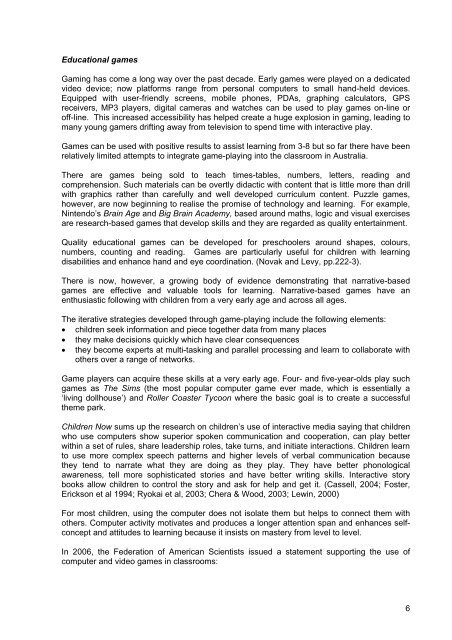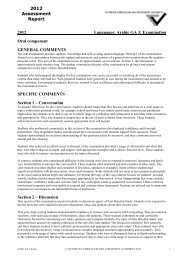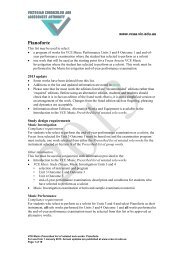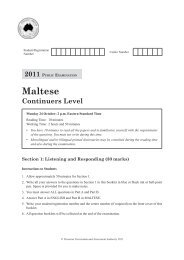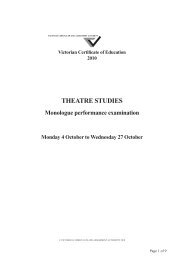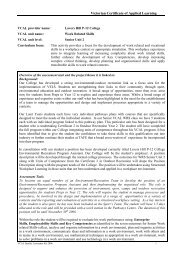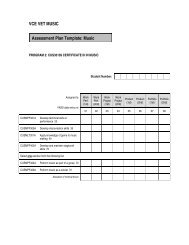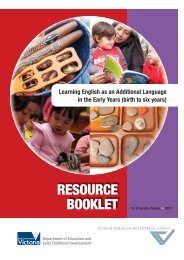television, digital media and children's learning - Victorian ...
television, digital media and children's learning - Victorian ...
television, digital media and children's learning - Victorian ...
You also want an ePaper? Increase the reach of your titles
YUMPU automatically turns print PDFs into web optimized ePapers that Google loves.
Educational games<br />
Gaming has come a long way over the past decade. Early games were played on a dedicated<br />
video device; now platforms range from personal computers to small h<strong>and</strong>-held devices.<br />
Equipped with user-friendly screens, mobile phones, PDAs, graphing calculators, GPS<br />
receivers, MP3 players, <strong>digital</strong> cameras <strong>and</strong> watches can be used to play games on-line or<br />
off-line. This increased accessibility has helped create a huge explosion in gaming, leading to<br />
many young gamers drifting away from <strong>television</strong> to spend time with interactive play.<br />
Games can be used with positive results to assist <strong>learning</strong> from 3-8 but so far there have been<br />
relatively limited attempts to integrate game-playing into the classroom in Australia.<br />
There are games being sold to teach times-tables, numbers, letters, reading <strong>and</strong><br />
comprehension. Such materials can be overtly didactic with content that is little more than drill<br />
with graphics rather than carefully <strong>and</strong> well developed curriculum content. Puzzle games,<br />
however, are now beginning to realise the promise of technology <strong>and</strong> <strong>learning</strong>. For example,<br />
Nintendo’s Brain Age <strong>and</strong> Big Brain Academy, based around maths, logic <strong>and</strong> visual exercises<br />
are research-based games that develop skills <strong>and</strong> they are regarded as quality entertainment.<br />
Quality educational games can be developed for preschoolers around shapes, colours,<br />
numbers, counting <strong>and</strong> reading. Games are particularly useful for children with <strong>learning</strong><br />
disabilities <strong>and</strong> enhance h<strong>and</strong> <strong>and</strong> eye coordination. (Novak <strong>and</strong> Levy, pp.222-3).<br />
There is now, however, a growing body of evidence demonstrating that narrative-based<br />
games are effective <strong>and</strong> valuable tools for <strong>learning</strong>. Narrative-based games have an<br />
enthusiastic following with children from a very early age <strong>and</strong> across all ages.<br />
The iterative strategies developed through game-playing include the following elements:<br />
• children seek information <strong>and</strong> piece together data from many places<br />
• they make decisions quickly which have clear consequences<br />
• they become experts at multi-tasking <strong>and</strong> parallel processing <strong>and</strong> learn to collaborate with<br />
others over a range of networks.<br />
Game players can acquire these skills at a very early age. Four- <strong>and</strong> five-year-olds play such<br />
games as The Sims (the most popular computer game ever made, which is essentially a<br />
‘living dollhouse’) <strong>and</strong> Roller Coaster Tycoon where the basic goal is to create a successful<br />
theme park.<br />
Children Now sums up the research on children’s use of interactive <strong>media</strong> saying that children<br />
who use computers show superior spoken communication <strong>and</strong> cooperation, can play better<br />
within a set of rules, share leadership roles, take turns, <strong>and</strong> initiate interactions. Children learn<br />
to use more complex speech patterns <strong>and</strong> higher levels of verbal communication because<br />
they tend to narrate what they are doing as they play. They have better phonological<br />
awareness, tell more sophisticated stories <strong>and</strong> have better writing skills. Interactive story<br />
books allow children to control the story <strong>and</strong> ask for help <strong>and</strong> get it. (Cassell, 2004; Foster,<br />
Erickson et al 1994; Ryokai et al, 2003; Chera & Wood, 2003; Lewin, 2000)<br />
For most children, using the computer does not isolate them but helps to connect them with<br />
others. Computer activity motivates <strong>and</strong> produces a longer attention span <strong>and</strong> enhances selfconcept<br />
<strong>and</strong> attitudes to <strong>learning</strong> because it insists on mastery from level to level.<br />
In 2006, the Federation of American Scientists issued a statement supporting the use of<br />
computer <strong>and</strong> video games in classrooms:<br />
6


